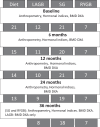Sex-differential testosterone response to long-term weight loss
- PMID: 39014246
- PMCID: PMC11420080
- DOI: 10.1038/s41366-024-01591-7
Sex-differential testosterone response to long-term weight loss
Erratum in
-
Correction: Sex-differential testosterone response to long-term weight loss.Int J Obes (Lond). 2024 Oct;48(10):1514. doi: 10.1038/s41366-024-01597-1. Int J Obes (Lond). 2024. PMID: 39103547 Free PMC article. No abstract available.
Abstract
Objectives: Obesity-associated gonadal dysfunction is a common comorbidity in patients seeking weight loss interventions. We examined the incremental effect of weight loss on gonadal axes in men and women over 3 years. Changes in sex hormones were compared between dietary intervention (Diet) and bariatric procedures: Roux-en-Y gastric bypass (RYGB), sleeve gastrectomy (SG) and laparoscopic adjustable gastric banding (LAGB). Additional analysis assessed changes in corticotropic, somatotropic and thyroid axes after weight loss interventions.
Methods: This prospective, observational study included 61 adults with Body Mass Index >30 kg/m2, mean age 51 (SD = 11) years. Endocrine parameters were measured at baseline and at 6 timepoints over 36-months.
Results: For each 1 kg of weight lost, between baseline and 36 months, total testosterone increased by 0.6% (95% CI: 0.2%, 1.0%, p = 0.002) in males and decreased by 0.8% (95% CI: -1.4%, -0.3%, p = 0.003) in females. These changes remained statistically significant when controlled for age and for menopausal status in females. At 36 months, in comparison with Diet, RYGB women had lower total testosterone by 54% (95% CI: -90%, -17%, p = 0.004), reduced free androgen index (FAI) by 65% (95% CI; -114%, -17%, p = 0.009) while SG had reduced FAI by 39% (95% CI; -77%, 0%, p = 0.05). No such differences between groups were noted for male subjects. Adrenocorticotropic hormone declined by 0.3% (95% CI: 0.0, -0.5%, p = 0.05), insulin-like growth factor-1 increased by 0.4% (95% CI; 0.2%, 0.7%, p = 0.005), without such thyrotrophin change for each 1 kg of weight loss, for entire cohort, over 36 months.
Conclusions: The testosterone changes observed in this study were proportional to the amount of weight loss. In females, reduction in androgens was independent of age and menopausal status and more pronounced after bariatric procedures. This study finding warrants further clinical research to explore an impact of androgen reduction on functional and cognitive status in postmenopausal women. The observed changes in pituitary hormones may contribute to the metabolic benefits of bariatric surgery.
© 2024. The Author(s).
Conflict of interest statement
MMB, DB, PAB, AM, JRG have no competing of interests to report. JAE and JRC disclosed relevant financial interests outside this body of work. JRC has received honoraria for educational talks and /or been on Advisory boards from Amgen and Theramex/Teva. JAE received consulting and research support from Amgen, Eli Lilly, Merck Sharp and Dohme and Novartis. This does not alter our adherence to the IJO on sharing data and materials.
Figures
References
Publication types
MeSH terms
Substances
LinkOut - more resources
Full Text Sources
Medical
Research Materials


